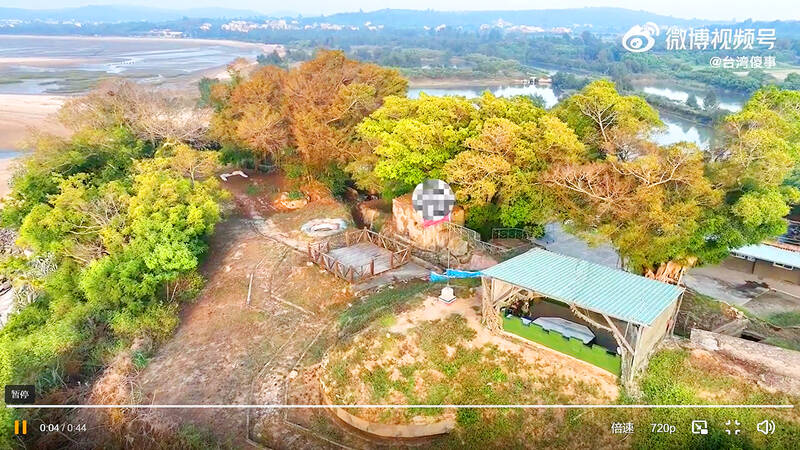The Kinmen Defense Command yesterday said it would drive Chinese drones out of Kinmen County, and shoot them down if warnings are ignored.
The command made the announcement after video footage taken from a drone that circled above troops stationed in the county’s Lieyu Township (烈嶼) circulated on Chinese microblogging site Sina Weibo (微博) on Saturday.
Troops had noticed the drone over the township on Saturday, and had determined it to be a civilian drone, the command said in a news release.

Photo: Still image taken from a video on Sina Weibo
In accordance with standard procedure, the troops fired a warning flare at the drone and went on high alert, it said.
The military aims to avoid escalating such situations, but would take countermeasures to prevent incursions into the country’s airspace by drones and other airborne objects, the command said, adding that China has been making such incursions with increasing regularity over the past few weeks.
“These repeated provocations are a threat to Taiwan’s national defense and aviation safety, and we will take necessary measures to stop them,” the command said.
On Aug. 16, a separate video circulated on Sina Weibo showing Taiwanese troops throwing stones at a Chinese drone that entered airspace above Erdan Islet (二膽).
The incident was criticized by the Ministry of National Defense as a Chinese attempt at cognitive warfare and sparked public debate about how the military should respond to “gray-zone” tactics — defined as coercive actions carried out by seemingly non-state or nonmilitary actors.
The ministry on Wednesday last week said it had already drafted plans for a drone defense system, which it expects to deploy next year.
GEOSAT Aerospace & Technology Inc (經緯航太科技) chief executive officer Lo Cheng-fang (羅正方) yesterday said that the army should not hesitate to use counter-drone weapons if any are spotted in Taiwan’s territorial airspace.
When faced by China’s provocative gray-zone tactics, the worst thing Taiwan can do is nothing, because it would simply encourage Beijing to be more aggressive, he said.
Lu Li-shih (呂禮詩), a former navy lieutenant commander, said that the army should try to set up a virtual perimeter known as a geofence around a no-fly zone between the offshore counties and China to stop drones from entering.
Democratic Progressive Party Legislator Wang Ting-yu (王定宇) said that the ministry could work with domestic drone manufacturers to devise drone-defense solutions.
Speaking about an incident yesterday in which two Chinese fishers washed up alive in the county, Wang said that authorities should provide all necessary assistance in such cases, but exercise caution and thoroughly investigate whether other motives are at play.

MAKING WAVES: China’s maritime militia could become a nontraditional threat in war, clogging up shipping lanes to prevent US or Japanese intervention, a report said About 1,900 Chinese ships flying flags of convenience and fishing vessels that participated in China’s military exercises around Taiwan last month and in January last year have been listed for monitoring, Coast Guard Administration (CGA) Deputy Director-General Hsieh Ching-chin (謝慶欽) said yesterday. Following amendments to the Commercial Port Act (商港法) and the Law of Ships (船舶法) last month, the CGA can designate possible berthing areas or deny ports of call for vessels suspected of loitering around areas where undersea cables can be accessed, Oceans Affairs Council Minister Kuan Bi-ling (管碧玲) said. The list of suspected ships, originally 300, had risen to about

DAREDEVIL: Honnold said it had always been a dream of his to climb Taipei 101, while a Netflix producer said the skyscraper was ‘a real icon of this country’ US climber Alex Honnold yesterday took on Taiwan’s tallest building, becoming the first person to scale Taipei 101 without a rope, harness or safety net. Hundreds of spectators gathered at the base of the 101-story skyscraper to watch Honnold, 40, embark on his daredevil feat, which was also broadcast live on Netflix. Dressed in a red T-shirt and yellow custom-made climbing shoes, Honnold swiftly moved up the southeast face of the glass and steel building. At one point, he stepped onto a platform midway up to wave down at fans and onlookers who were taking photos. People watching from inside

Japan’s strategic alliance with the US would collapse if Tokyo were to turn away from a conflict in Taiwan, Japanese Prime Minister Sanae Takaichi said yesterday, but distanced herself from previous comments that suggested a possible military response in such an event. Takaichi expressed her latest views on a nationally broadcast TV program late on Monday, where an opposition party leader criticized her for igniting tensions with China with the earlier remarks. Ties between Japan and China have sunk to the worst level in years after Takaichi said in November that a hypothetical Chinese attack on Taiwan could bring about a Japanese

STREAMLINED: The dedicated funding would allow the US to transfer equipment to Taiwan when needed and order upgraded replacements for stockpiles, a source said The US House of Representatives on Thursday passed a defense appropriations bill totaling US$838.7 billion, of which US$1 billion is to be allocated to reinforcing security cooperation with Taiwan and US$150 million to replace defense articles provided to the nation. These are part of the Consolidated Appropriation Act, which the US House yesterday passed with 341 votes in favor and 88 against. The act must be passed by the US Senate before Friday next week to avoid another government shutdown. The US House Committee on Appropriations on Monday unveiled the act, saying that it allocates US$1 billion for the Taiwan Security Cooperation Initiative